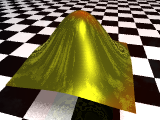Open Source Tools for Chemistry
The scientific process improves placing your methods and results in the public domain and allowing other scientists to build on your work to make additional discoveries or apply your methods to new problems. Applying the same idea to the development of software leads to Open Source software.
The table below describes my involvement in several Open Source chemistry projects. New releases of software are advertised on my blog, and an up-to-date inventory of chemistry software (of all types) is available at Linux4Chemistry.
| Description | Contribution | |
|---|---|---|

|
Open Babel is a chemical toolbox designed to speak the many languages of chemical data. It's an open, collaborative project allowing anyone to search, convert, analyze, or store data from molecular modeling, chemistry, solid-state materials, biochemistry, or related areas. |
I have been involved with the development of the Python interface to OpenBabel [ChemCentJ2008], rewriting the stereochemistry handling (particularly in SMILES), have implemented 3D alignment (OBAlign) and in general have pushed forward the use of Open Babel as a cheminformatics toolkit. I have also worked on documentation, fixing bugs and in helping users with problems. |

|
Cinfony is a Python library that allows you to access three cheminformatics toolkits (OpenBabel, RDKit and the CDK) with the same API. |
I'm the sole developer. This software has been described in a publication [ChemCentJ2008]. |

|
GaussSum is a program for analysing the output of computational chemistry calculations. It is particularly useful for correlating experimental results with calculated properties. |
I'm the sole developer. I released the first version during my PhD and now a couple of years later it has really taken off. For example, it has been cited 23 times in 2008 alone [JCompChem2008]. |

|
cclib is a Python library for parsing output files of computational chemistry programs. This allows the implementation of algorithms which are independent of any package. |
I'm one of the two founders, and currently we have three active developers. It is currently used by both GaussSum and QMForge. A paper on cclib has been published [JCompChem2008]. |

|
PyQuante is an open-source suite of programs for developing quantum chemistry methods. The goal of this software is to provide a well-engineered set of tools so that scientists can construct their own quantum chemistry programs without going through the tedium of having to write every low-level routine. |
I ported this application to Windows and created the installer. There are now almost as many downloads of the Windows version as the original Linux version. I also helped set up a standard test suite with unittest. |

|
PyChem is a multivariate statistical toolbox with a GUI. It is especially useful in the field of metabolomics, and can carry out principal component analysis, partial least squares regression, cluster analysis and discriminant function analysis. |
I was involved in porting this application to the Linux platform. [Bioinf2006] |
